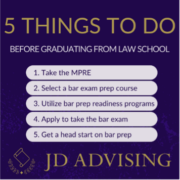How to Study Smart for the Essay Portion of the Michigan Bar Exam
How to Study Smart for the Essay Portion of the Michigan Bar Exam
NOTE: Michigan is switching to the Uniform Bar Exam starting with the February 2023 administration! Find more information here.
In this blog post we’ll focus on how to study smart for the Michigan bar exam and focus on the essay portion. In order to study smart for the essay portion of the Michigan bar exam, the first thing you have to do is review the substantive law of each subject before attempting to answer essay questions on that subject. It is crucial that you are familiar with the relevant area of law before you attempt to answer a question on it. If you do not feel very comfortable with the substantive law, you will answer questions incorrectly, get frustrated, and feel stressed out! Conversely, if you review the substantive law before attempting to answer questions, you will fee more confident.
How to Study Smart for the Essay Portion of the Michigan Bar Exam
Second, don’t treat all subjects equally! There are 24 possible Michigan bar exam subjects that could be tested. However, you will find that many of the subjects are hardly ever tested. In fact, a typical Michigan bar exam tests the 15 subjects listed below. Subjects 1 through 9 (in black font) are also subjects you will have to know for the MBE. The following six (in blue font) are Michigan subjects that will not appear on the MBE. The questions in parentheses mean that you may see those questions, generally in place of the one it is next to. For example, you may see Secured Transactions instead of Sales (although generally Sales is tested). You may also see No Fault Insurance instead of Torts (but generally you will see Torts) or Conflicts of Law instead of Constitutional Law (but generally you will see Constitutional Law). (Note: The Michigan Board of Law Examiners can, in theory, test whatever subjects it wants to test on the Michigan bar exam! We have simply noticed that these are the subjects that are most commonly-tested.)
- 1. Criminal Law
- 2. Criminal Procedure
- 3. Contracts
- 4. Sales (or Secured Transactions)
- 5. Torts (or No Fault Insurance)
- 6. Evidence
- 7. Constitutional Law (or Conflicts of Law)
- 8. Real Property
- 9. Civil Procedure
- 10. Domestic Relations
- 11. Personal Property
- 12. Corporations (or Agency, or Partnership)
- 13. Workers’ Compensation
- 14. Professional Responsibility
- 15. Wills OR Trusts
This means that you will probably see all nine of the subjects you learn for the MBE tested, although sometimes Michigan distinctions for these MBE subjects are tested. For example, a rule of Criminal Law may be different in Michigan than it is under the “majority law” that is tested on the MBE. You will be expected to know these Michigan distinctions when you answer the essay portion.
In addition to the nine subjects that overlap with the MBE, you will likely see six Michigan-specific subjects tested. Many bar exams contain these standard questions. There is a good chance you will not see a question on Agency, Partnership, Conflicts, Equity, No Fault Insurance, Secured Transactions, or Commercial Paper/Negotiable Instruments at all. If you do, you will likely see one or two of those subjects but not any more than that. So there is no reason to “treat all subjects equally” when you are studying for the bar exam. Instead, study smart by focusing the majority of your time on the subjects that will most likely appear on the Michigan bar exam.
Just like you shouldn’t treat all subjects equally, you should also be careful to not treat all topics equally, either. For example, the last few times that Conflicts of Law was tested (the most recent time was July 2008) the issues were nearly the same (choice of law in a contractual dispute and, more recently, choice of law in a tort dispute). Thus, if you only have a limited time to study for the bar exam, rather than spending an inordinate amount of time trying to memorize all 50 pages of your bar review course’s Conflicts of Law outline, it may be a better to skim the outline to get the bigger picture but focus most of your time and energy on topics that have been tested the most heavily in the past. This is the best way to study smart for the bar exam. (To find which topics are highly-tested, buy our new book, How to Pass the Michigan Bar Exam, or, if you’d rather go through the essay questions on your own, read this post to see where to find past Michigan bar exam essay questions.)
If you would like a lot more information about how to study smart for the Michigan bar exam, please check out our new book, How to Pass the Michigan Bar Exam!
Looking to Pass the Bar Exam?
Free Resources:
- 🌟Bar Exam Free Resource Center: Access our most popular free guides, webinars, and resources to set you on the path to success.
- Free Bar Exam Guides: Expert advice on the MBE, the MEE, passing strategies, and overcoming failure.
- Free Webinars: Get insight from top bar exam experts to ace your preparation.
Paid Resources:
- 🏆One-Sheets: Our most popular product! Master the Bar Exam with these five-star rated essentials.
- Bar Exam Outlines: Our comprehensive and condensed bar exam outlines present key information in an organized, easy-to-digest layout.
- Exclusive Mastery Classes: Dive deep into highly tested areas of the MBE, MEE, MPT, and CA bar exams in these live, one-time events.
- Specialized Private Tutoring: With years of experience under our belt, our experts provide personalized guidance to ensure you excel.
- Bar Exam Courses: On Demand and Premium options tailored to your needs.
- Bar Exam Crash Course + Mini Outlines: A great review of the topics you need to know!
🔥 NEW! Check out our Repeat Taker Bar Exam Course and our new premier Guarantee Pass Program!






Trackbacks & Pingbacks
[…] that most Michigan bar exams contain standard 15 questions (you can see a list of the standard 15 Michigan bar exam questions here). If you are trying to make your own predictions, start by looking at the subjects you are most […]
[…] typical Michigan bar exam tests these fifteen subjects (give or take). Sometimes they switch it up and test No Fault instead of Torts or Secured […]
Comments are closed.